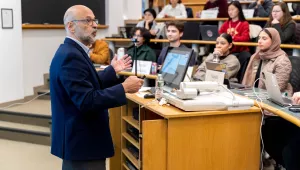Kyriakos Mitsotakis (Harvard BA ’89), president of the Greek opposition party Nea Dimokratia (New Democracy,) laid out his vision for a tough but achievable strategy to revitalize the Greek economy and strengthen the nation’s ties to the European Union in an October 13 seminar.
Greece needed to enhance its functional cooperation with the Eurogroup, European Central Bank and the International Monetary Fund in order to catalyze much-needed reforms, though he said certain conditions imposed by the European Union - such as strict limits on public deficits and national debt – needed to be modified to allow for continued recovery. Though the path would not be easy, an honest and practical strategy that would create a “pro-business environment” would have lasting, positive impact on the in the long run. After years of economic depression and several failed attempts to pull the nation out of crisis, “the Greek people deserve the truth,” he said of his political advocacy strategy. A dedicated crackdown on corruption and vested interests to restore faith in government would be a hallmark of his party’s policies should they win a significant majority in the next Greek election. To fully realize its potential, the country would have to commit to continued structural reforms to build accountability and reassure foreign investors of the soundness of the Greek economy.
Mitsotakis also said that the involvement of a younger generation of Greeks was key to the success of a comprehensive approach to political and economic reforms. “Young people are tired of politics and corruption, but this feeling can be used in a productive way,“ he said, adding, “It is my obligation to give young people a chance in politics.” In order to act upon this obligation, he said, Nea Dimokratia called for young people to apply to positions within the party, generating hundreds of applications. The response from young Greeks was encouraging, Mitsotakis said, because it was a sign that they responded to the party’s mission, under his leadership, to “build a culture of hope by telling the truth.”
Ultimately, Mitsotakis said, he believed that this approach would allow Nea Dimokratia to gain the majority in Parliament after Greece’s next elections, currently scheduled for 2019. Based on the latest approval polls at the time of writing, which showed Nea Dimokratia leading the ruling Syriza party by several percentage points, this goal was not unrealistic, said Mitsotakis, and its achievement would allow the party to enact reforms he had described on a large scale. These changes, he said, would allow Greece to embark at on a sustainable path to recovery after several false starts and years economic stagnation.




